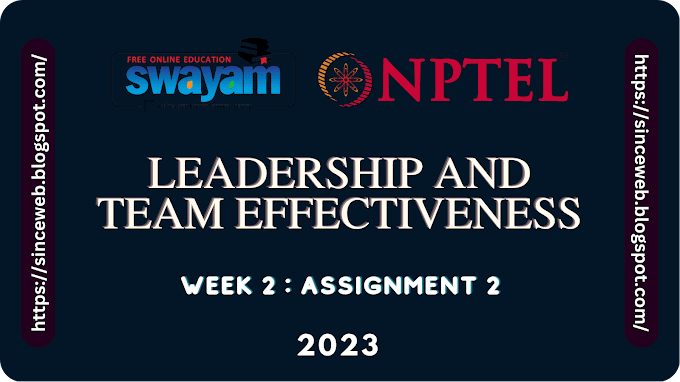Week 1 NPTEL Ethical Hacking Answer 2023
Answer to Ethical Hacking NPTEL Course 2023 available in our blog Week 1 NPTEL Ethical Hacking Answer 2023 find answer on Sinceweb blogpost
 |
NPTEL Ethical Hacking Answer 2023 |
NPTEL » Ethical Hacking
Ethical hacking, also known as "white hat" hacking, is the practice of using hacking techniques to test and secure computer systems, networks, and websites. Ethical hackers are hired by organizations to simulate real-world attacks in order to identify vulnerabilities and weaknesses in their systems. The goal of ethical hacking is to improve the security of the organization's systems and protect them from malicious attacks.
Ethical hackers use a variety of techniques and tools to identify vulnerabilities, such as network and penetration testing, social engineering, and vulnerability scanning. They also use the same methods and tools as malicious hackers, but with the permission and guidance of the organization.
Once vulnerabilities are identified, ethical hackers will work with the organization to develop and implement solutions to address them, such as patching software, strengthening passwords and implementing intrusion detection systems.
Ethical hacking is a critical part of cybersecurity, as it helps organizations to identify and address vulnerabilities before malicious actors can exploit them. Ethical hackers play a vital role in protecting organizations from cyber threats, and help to ensure the confidentiality, integrity, and availability of sensitive data.
However, it's important to note that ethical hacking, just like any other profession, requires certifications, knowledge and expertise, and a deep understanding of the legal and ethical considerations that surround the field.
Week 1 NPTEL Ethical Hacking Answer 2023:
1.
Answer: a
2.
Answer: b & d
3.
Answer: 170
4.
Answer: a & d
5.
Answer: b
6.
Answer: c
7.
Answer: b
8.
Answer: a
9.
Answer: 2028
10.
Answer: 6
| NPTEL Ethical Hacking Assignment 1 | Click Here |
| NPTEL Ethical Hacking Assignment 2 | |
| NPTEL Ethical Hacking Assignment 3 | |
| NPTEL Ethical Hacking Assignment 4 | |
| NPTEL Ethical Hacking Assignment 5 | |
| NPTEL Ethical Hacking Assignment 6 | |
| NPTEL Ethical Hacking Assignment 7 | |
| NPTEL Ethical Hacking Assignment 8 | |
| NPTEL Ethical Hacking Assignment 9 | |
| NPTEL Ethical Hacking Assignment 10 | |
| NPTEL Ethical Hacking Assignment 11 | |
| NPTEL Ethical Hacking Assignment 12 |
Course layout
Week 1: Introduction to ethical hacking. Fundamentals of computer networking. TCP/IP protocol stack.
Week 2: IP addressing and routing. TCP and UDP. IP subnets.
Week 3: Routing protocols. IP version 6.
Week-4: Installation of attacker and victim system. Information gathering using advanced google search, archive.org, netcraft, whois, host, dig, dnsenum and NMAP tool.
Week-5: Vulnerability scanning using NMAP and Nessus. Creating a secure hacking environment.
System Hacking: password cracking, privilege escalation, application execution. Malware and Virus. ARP spoofing and MAC attack.
Week 6: Introduction to cryptography, private-key encryption, public-key encryption.
Week 7: Cryptographic hash functions, digital signature and certificate, applications.
Week 8: Steganography, biometric authentication, network-based attacks, DNS and Email security.
Week-9: Packet sniffing using wireshark and burpsuite, password attack using burp suite.
Social engineering attacks and Denial of service attacks.
Week 10: Elements of hardware security: side-channel attacks, physical inclinable functions, hardware
trojans.
Week-11: Different types of attacks using Metasploit framework: password cracking, privilege escalation,remote code execution, etc.Attack on web servers: password attack, SQL injection, cross site
scripting.
Week 12: Case studies: various attacks scenarios and their remedies.
CRITERIA TO GET A CERTIFICATE
Average assignment score = 25% of average of best 8 assignments out of the total 12 assignments given in the course.
Exam score = 75% of the proctored certification exam score out of 100
Final score = Average assignment score + Exam score
YOU WILL BE ELIGIBLE FOR A CERTIFICATE ONLY IF AVERAGE ASSIGNMENT SCORE >=10/25 AND EXAM SCORE >= 30/75. If one of the 2 criteria is not met, you will not get the certificate even if the Final score >= 40/100.
NOTE: Please note that there will not be an unproctored programming exam for this course this term.
COURSE TYPE : Elective
COURSE LEVEL: Undergraduate/Postgraduate
Disclaimer:
The answers provided in this blogpost are for reference only and should not be used as a substitute for your own research and understanding of the subject matter. The answers have been researched and compiled to the best of our knowledge, but we cannot guarantee their accuracy or completeness. We strongly advise that you use this information as a starting point for your own research and not as the sole basis for your work. Please use your own discretion and always consult your instructor or professor for guidance.






.png)
